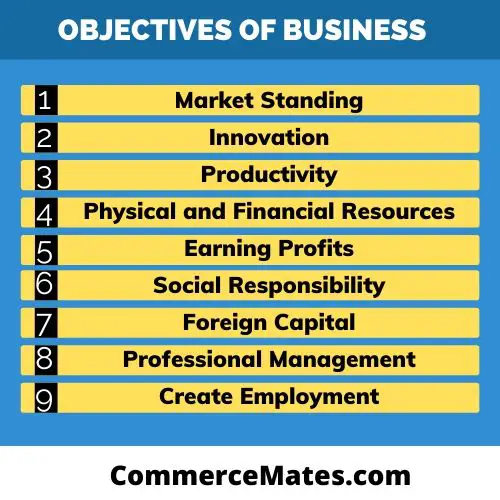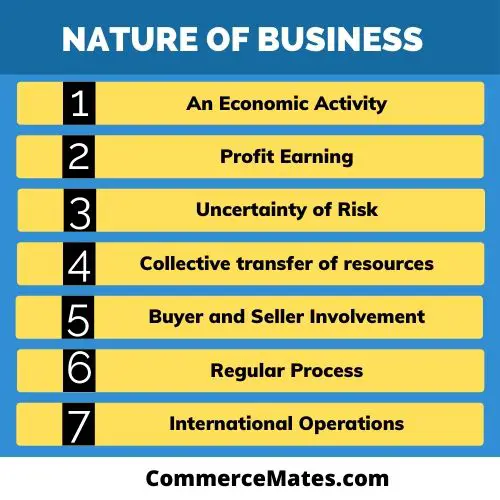Contents
Meaning of Business
The term business is derived from the word ‘busy’. Business is defined as the production or purchase of the goods and services with the intention of selling them at profit. Business is an organized economic activity. it is nothing but a way of making money from economic transactions.
Objectives of Business
Market Standing
Market standing means position of an the enterprise in relation to its competitors. Every business enterprise must aim at standing on strong position in market in order to provide best offers to its customers and serving them to their satisfaction. In this global economy, market standing is becoming important, that’s why companies spending huge amount on marketing and advertisement to acquire new customers.

Innovation
Innovation is the introduction of new ideas or methods in the way something is
done or made. There are two types of innovation in every business innovation in
product or services and innovation in various skills that needed to improve quality and quantity of products and services. Every business enterprise wants to be in race. So, innovation becomes an important objective.
Productivity
Productivity is an important activity of the business. In order to continuous survival and progress, every business must aim to increase productivity through the best use of available resources. When the company increases productivity, it decreases the price of its products. Which helps the company to increase, its market share.
Physical and Financial Resources
If the business wants to stay for long run, it needs two physical resources and financial resources. physical resources includes plants, machines, offices, etc., and
financial resources includes funds to be able to produce and supply goods and services to its customers.
Earning Profits
One of the main objectives of business is to earn profits and growth of the company. Every business must earn a reasonable profit for its survival and growth. Profit is ultimately aim of every business, without profit business can not survive for long time. Business should have proper revenue plan in order to grow.
Social Responsibility
Social responsibility refers to contribute resources for solving social problems and work in a socially desirable manner. Business uses the natural resources of the society, So the business should contribute its resources to solve the social issues.
Foreign Capital
A big business can help the developing economies to secure capital from the developed countries. they facilitate transfer of capital from countries where it s abundant to countries where it is scare. Thus, Business can help to increase the investment level and thereby the pace of development of host country.
Professional Management
Business brings managerial revolution in the host countries through professional management and the employment of sophisticated management techniques and practices.
Create Employment
When the business starts, it creates employment from top executives to lower worker. it satisfied social needs and help them to upgrade life style of the people.
Nature of Business
An Economic Activity
Business is an economic activity with the aim to make a profit and provides products and services to consumers. It is a process that involves exchanges of goods and services in monetary terms. That makes business economic activity.

Profit Earning
The main purpose of business is earn profit. Profit is the main objective of every business, without earning profit company can not survive in long run. if profit doesn’t take place in transaction, then it cannot be considered as business transaction. For example, goods given in charity is not a business activity.
Uncertainty of Risk
Business has always uncertainty, There is always a possibility of losses of business. It is not possible for a businessman to earn adequate profit always, as market conditions may change, customer’s taste may change. All these can lead to loss.
Collective transfer of resources
A business facilitates a multilateral transfer of resources. Usually this transfer takes place in the form of a “package” which includes technical know-how, machinery, and equipment, raw materials, management expertise, etc.
Buyer and Seller Involvement
Business is a process of exchanging of products and services which involves buyers and sellers. Without buyers and seller, business can not take place.
Regular Process
Business is a regular process, it provides daily uses products and services. That makes a business regular Process. People buy products and services daily, which makes the business process alive.
International Operations
A big business operates in many countries through a parents corporation in the home country. it runs its operations through a network of branches and subsidiaries in host counties. Production, marketing and other operations are scattered in different counties to reap the economies of local operations.
Types of Business
Sole Proprietorship
A sole proprietor is a person who carries on business exclusively by and for himself . It is very easy to start a small business on sole tradership basis because of very few legal formalities . According to Kimball and Kimball , “ The individual proprietor is the supreme judge of all matters pertaining to his business subject only to general laws of the land to such special legislation as may affect his particular business . “
Features of Sole Proprietorship
- No Separate Entity: A sole tradership concern has no separate legal entity independent of the owner. The owner and the business concern are one and the same. The owner owns everything the business owns and he owes everything the business owes .
- Capital: In sole tradership , the capital is employed by the owner himself from his personal resources . He may also borrow money from his friends and financial institutions if he cannot depend solely on his personal resources .
- Unlimited Liability: The liability of the proprietor for the debts of the business is unlimited. The creditors have the right to recover their dues even from the personal property of the proprietor in case the business assets are not sufficient to cover their debts.
- Profits and Losses: The surplus arising in the business of the sole trader entirely belongs to him and similarly all the business losses and risks are to be borne by him alone.
One person company
One person company is a company in which one man holds virtually the whole of the share capital with a few extra members holding the remainder , who may be his relations or nominees. Being the largest shareholder, such a person is generally the sole or the managing director and enjoys complete control over the company.
This is done with a view to fulfill the statutory requirements of at least seven members in the case of a public company and at least two members in the case of private company. He is, thus, in a position to enjoy the profits of the business with limited liability. Such types of companies are perfectly valid and not illegal .
Features of One person company
- OPC may be registered as a private company with one member and may also have one director.
- OPC will have a corporate entity of its own.
- The sole shareholder of an OPC shall be liable only to the extent of its capital. If the activities are carried out in a mala fide manner, the liability of the sole shareholder would extend to his personal property.
- An OPC may be managed by the owner or his representative.
- Minimum share capital may be prescribed for an OPC by the Government.
- Every OPC shall have at least one director.
- An OPC shall have to indicate the name of the person who in the event of the subscriber’s death , disability etc. would become the member of the company.
Joint Hindu Family Business
The Joint Hindu Family firm comes into existence by operation of law. It is governed by the Hindu law and Hindu customs. If the business set up by a person is carried on by male members of his family after his death, it is called Joint Hindu Family business. Joint Hindu Family has an entity of its own and its members are merely co-owners.
Features of Joint Hindu Family Business
- Male Members: The membership of a Joint Hindu family business consists of only the male members. The membership is not created by an agreement but is determined by birth. The membership is restricted to three successive generations.
- Membership by Birth: A person automatically becomes a member in Joint Hindu Family by taking birth in that family. There is no need for any agreement.
- Management: The management of such a business vests in the eldest members of the family, called Karta . The Karta, however, may associate other members to assist him in the management of business.
- Liability: The liability of the Karta is unlimited i.e , even his personal assets can be used for the payment of business dues. The liability of other members is limited to the extent of their share in the property of the family business
- Minor Members: In Joint Hindu Family Business a child becomes a member by birth only, so there is no restriction for a minor to become a member of the business.
Limited Liability Partnership (LLP)
Limited liability partnership is a corporate form of organisation that provides the benefits of limited liability but allows its partners the flexibility of organizing internal structure as partnership based on mutual agreement between them. Limited liability partnership is an alternative to the traditional partnership with unlimited personal liability, on the one hand , and the Companies Act based governance structure of the limited liability company.
Features of Limited Liability Partnership (LLP)
- Regulating Act:An LLP is governed by the Limited Liability Partnership Act , 2008. The provisions of the Indian Partnership Act , 1932 are not applicable to LLP .
- Separate Legal Entity: An LLP is a body corporate and a legal entity separate from its partners. It is an artificial person being invisible intangible having no body , no mind and no soul. It exists only in the eyes of law .
- Perpetual Existence : The LLP has perpetual succession. Any change in its partners shall not affect the existence of the LLP . Thus , statu wise , an LLP is more akin to a company .
- Number of Partners : Every LLP shall have at least two partners There is no maximum limit for the number of partners for the LLP.
- Management of Business: Every LLP is created for carrying out business with a view to earn profit. The partners have the right to manage the business directly, unlike corporate shareholders.